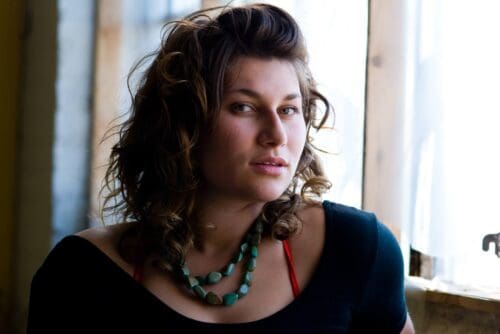ONE WEEK ON THE ROAD
by Alessandra Naccarato
—
- DEPARTURE: Salt Spring Island, BC
 My cat did not do a very good job of saying goodbye. She slid past my legs and ran into the garden, up a tree. My partner did a better job. Walked me down the hill to the ferry. There’s something perfectly melancholic about saying goodbye at a pier. Waving goodbye as the boat pulls from the harbor. An eagle above us, and mountains in the distance.
My cat did not do a very good job of saying goodbye. She slid past my legs and ran into the garden, up a tree. My partner did a better job. Walked me down the hill to the ferry. There’s something perfectly melancholic about saying goodbye at a pier. Waving goodbye as the boat pulls from the harbor. An eagle above us, and mountains in the distance.
Three months, I’ll be on the road. Crossing Canada, touring my newly released album, and working with youth in Toronto. It’s a far cry from the sweet quiet life I’ve been living on Salt Spring Island, where you don’t run into anyone on a hike by the ocean. But to say I don’t crave the city would be a lie. I miss the busy streets and busses that come more often than every two hours. The plethora of cafes. And most of all: the poets. Booking 20+ shows across the country is, on the one hand, an organization hoopla, and on the other, a chance to drop in on almost every spoken word scene in the country. A chance to witness and be heard.
So I held my head up high and got on the boat, with an overstuffed suitcase and a wide brimmed hat.
- INSPIRATION: Edmonton, AB
I happened to get in town in time for Sister 2 Sister, a new reading series for women of colour run by the ineffable Nasra Adem. I wasn’t sure what to expect – mid-afternoon in a new city. What I saw unlocked something in me. Lady Vanessa C.C., who describes her own work as “plain, frank, spoken truth” wove in and out of poems that were as raw as they were beautiful. Watching her, I was reminded of the ways we sometimes use craft to cover our vulnerability. There she was, simply speaking her truth to the audience –deciding mid-set that she needed a five minute break. It was powerful stuff, further charged by Yes (Estanfania) from Toronto, and excepts of Nasra Adem’s play which will be featured at the rock.paper.sistahz Theatre festival in Toronto this May.
By the time I got to my own show, I was all lit up. By what I had heard, and what I was about to hear. It is work to put on your own shows in cities across the country, but the privilege is that you get to invite some of your favorite poets to join you on stage. Enter Mary Pinkoski, Colin Matty and Liam Coady. We had a small crowd that night, but the poets gave everything they could, and by the time I got on stage, I nearly had an out-of-body experience.
The night ended like you can only hope it will while on tour. Drinking cider around a back yard fire, as somebody cooks up midnight burgers and everyone climbs up onto the roof for stargazing.
- INNOVATION: Calgary, AB
The biggest intrigue of this tour came from Sheri-D Wilson and the first annual School of Thought. After over a decade of directing the Calgary International Spoken Word Festival, Sheri-D closed the doors last year, making room for new possibilities. What she developed pushes the boundaries between festival and conference, bringing together poets and social activists for eight events that explore “languages lost & found”. Every poet in every event was commissioned to develop a new seven-minute piece on the theme, and performances were joined by round tables and workshops, including “How to Speak Klingon” with the creator of the language, Mark Okrand, and a event focusing on indigenous languages.
For months, across the country, poets have been preparing for this. Exploring, in their own way, what it means to loose and find language. Everyone, it seemed, came to their own conclusion. For some, it was literal (if not unusual) language. Billeh Nickerson opened the first night of School of Thought, exploring –in his wonderfully tender and comedic way, French Immersion and the passage of his relationship to language. Sheri-D Wilson, gracing the opening event as well, brought us to Stonehenge and the language of crows until the entire audience was laughing so hard they cried.
The event I took part in was a gathering of women’s voices. The language I landed on was girlhood; trying to give words to a point in time when I found myself without a language that fit. The process of writing this work tore me inside out, brought me to the story of a woman who just went missing. For the first time in my career, my voice broke on stage and one or two tears made an appearance. Not what I had planned. Not what I expected from the theme. But this kind of intensity was a running aspect of the evening. Curating the event, I expect Sheri-D had a strong sense that the night would go deep into grief as well as celebration. I imagine this is why she held the space as she did –for the work to be not only a conversation, but a transformation for both speaker and audience. This is the crux of art meeting social innovation. This is the vision of School of Thought.
Later that night, poet Tanya Evanson voiced that the evening has been about both language lost and the language of loss. Her piece, which closed the night beautifully, explored art-makers as their own kind of genus – the lunarians, she called us. It was a way to bring us back to ourselves. It was language found, a gift to all of us in the room.
 At brunch the next day, I was surrounded by the women I had performed with. I could feel between us the kinship that comes from collective action. Something deeper than just sharing the stage. In delving into the same exploration, we had braided the threads of our stories, we had found a new language between us.
At brunch the next day, I was surrounded by the women I had performed with. I could feel between us the kinship that comes from collective action. Something deeper than just sharing the stage. In delving into the same exploration, we had braided the threads of our stories, we had found a new language between us.
- UP NEXT: Toronto, ON
As School of Thought continued in Calgary, I headed to Toronto, planning to stay connected to the festival through the live-stream of the events. I arrived in the city around midnight, with a stubborn cold and jetlag, but still woke up the next morning ready to go. For the past three years, I have hosted an annual coffee house and poetry slam organized by the English Department of the Toronto District School Board. This year, there were nine teams of poets from across the city, competing through out the day, alongside performances by playwright and poet Amani, spoken word artist and director of Toronto youth slam Patrick de Belen, and dub-poet Clifton Joseph.
Listening to the young people perform, I was struck by the same things that moved me in Edmonton and Calgary –authenticity, vulnerability, the willingness to take both personal and creative risks. The day closed with an unbelievable performance by the same young poet who has exploded the room for the past three years – Faith Paré. Trust me when I say you will be hearing from her. Currently on the BAM Youth Slam Team, headed to Brave New Voices in Washington this summer, her work is already among the strongest I have seen in Canada.
It was a powerful way to finish my first week on the road. Three cities, dozens of poets, and the knowledge that poetry is alive and well in Canada. Not just as an artistic force, but as a social and political one as well.
—

Alessandra Naccarato is a writer, performer and teacher based on Salt Spring Island, BC. Winner of the Bronwen Wallace Award for Emerging Writers, the Reader’s Choice Award for the CBC Poetry Prize, and Event Magazine’s Creative Non-Fiction Award, her writing has appeared across Canada and the United States. She has toured nationally and internationally as a spoken word artist, worked with thousands of youth across the country, and is currently completing an MFA in Creative Writing at the University of British Columbia.
